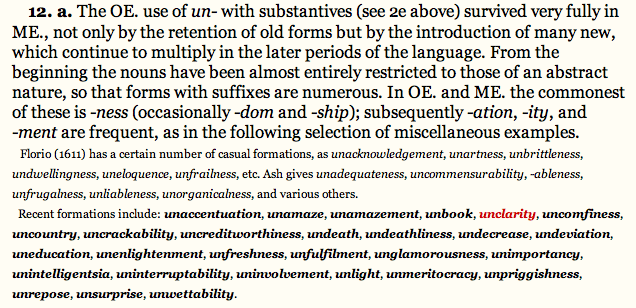February 11, 2008
Searching for (un)clarity in the OED
 Geoff Pullum recently brought us up to speed on the case of Dr. Rowan Williams, Archbishop of Canterbury, who has been credited by the British media with the idea that the adoption of shari'a law in Britain "seems unavoidable." As Geoff explained, Dr. Williams didn't really say that, but his remarks were hardly "a model of clarity." Now, according to the (UK) Times columnist Alan Hamilton, Dr. Williams has come out with a statement acknowledging his lack of clarity (if not actually apologizing for it):
Geoff Pullum recently brought us up to speed on the case of Dr. Rowan Williams, Archbishop of Canterbury, who has been credited by the British media with the idea that the adoption of shari'a law in Britain "seems unavoidable." As Geoff explained, Dr. Williams didn't really say that, but his remarks were hardly "a model of clarity." Now, according to the (UK) Times columnist Alan Hamilton, Dr. Williams has come out with a statement acknowledging his lack of clarity (if not actually apologizing for it):
“Some of what has been heard is a very long way indeed from what was actually said in the Royal Courts of Justice last Thursday. But I must, of course, take responsibility for any unclarity in either that text or in the radio interview, and for any misleading choice of words that has helped to cause distress or misunderstanding among the public at large and especially among my fellow Christians.”
Hamilton chose to follow up the Archbishop's statement by questioning a single word from it: unclarity.
So, Christians: to pride, lust and the rest, add the eighth deadly sin of “unclarity” — a word that is obscure enough not to appear in the Oxford English Dictionary.
I've said it before and I'll say it again: people who don't know how to use a dictionary shouldn't try to appeal to lexicographical authority to advance an argument.
It's true that if you browse through the headwords of the OED, you will not find unclarity. But there are a lot of words in the OED that don't merit their own headwords. Chief among them are words regularly formed by common prefixes like un-, where the meaning is "compositional," i.e., transparently understood by the combination of the prefix plus the root (as in un- + clarity). It's a bit laborious to wade through an entry like un- in the print edition of the OED, but the electronic versions (either on CD-ROM or online) will take you directly to the relevant part of the entry when you type in the prefixed word. Entering unclarity into the online OED search form brings you to this part of the un- entry:

A bit further on are the historical citations for the word:

This entry hasn't been updated since the 1989 second edition, so it has yet to be enriched with citations antedating the 1934 Webster's dictionary entry, now easily found in digitized texts — for instance, in the 1912 book The New Realism. Still, the OED found room for a 1936 cite from the journal Mind and a 1980 cite from Le Carré's Smiley's People, suggesting that this is a word that can be found in a variety of reputable sources, albeit infrequently.
Does the fact that unclarity is indeed in the OED suddenly make it less "obscure"? I'd argue that the word was never obscure to begin with, regardless of its inclusion in the OED, since it is a transparent combination of a common prefix and a common noun. That, however, does not have any real bearing on the Archbishop's sad situation. The knives are out for him now, and his every word is used against him — even words seeking to clarify his lack of clarity.
[Update: Arnold Zwicky notes that there are huge number of web hits for unclarity, including this gem:
Vagueness is standardly defined as the possession of borderline cases. For example, 'tall' is vague because a man who is 1.8 meters in height is neither clearly tall nor clearly non-tall. No amount of conceptual analysis or empirical investigation can settle whether a 1.8 meter man is tall. Borderline cases are inquiry resistant. Indeed, the inquiry resistance typically recurses. For in addition to the unclarity of the borderline case, there is normally unclarity as to where the unclarity begins. In other words 'borderline case' has borderline cases. This higher order vagueness shows that 'vague' is vague.
— Roy Sorensen, Stanford Encyclopedia of Philosophy, "Vagueness"
Arnold also observes that unclarity provides an instance of the "bracketing paradoxes" in morphology ("unhappier", "transformational grammarian", etc.). Semantically, it's:
[ un + clear ] + ity
but phonologically it's:
un + [ clar + ity ] .
]
Posted by Benjamin Zimmer at February 11, 2008 11:09 PM